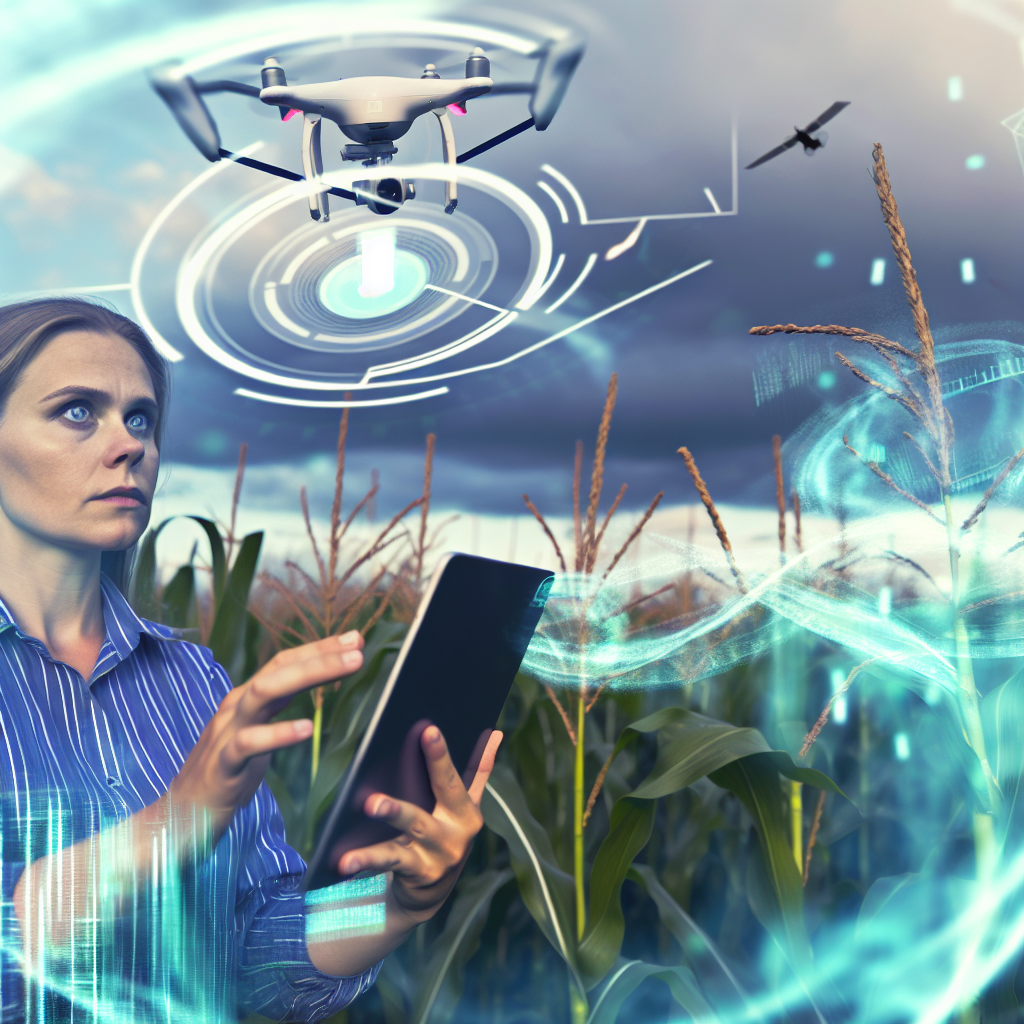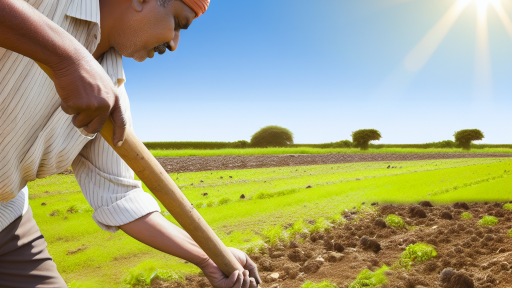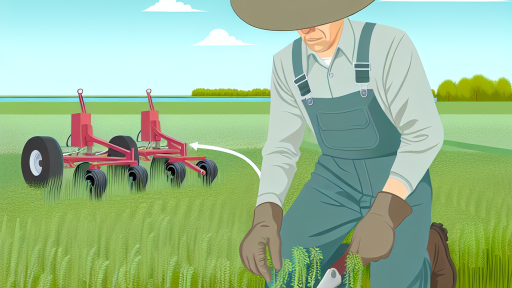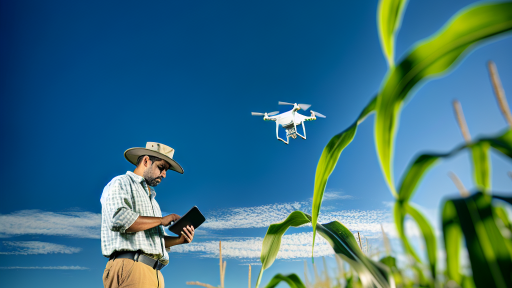Introduction to AI in Agriculture
Artificial intelligence transforms the agricultural industry significantly.
It enhances efficiency and productivity for farmers globally.
AI technologies assist in making data-driven decisions.
Overview of Crop Analytics
Crop analytics refers to the systematic analysis of agricultural data.
This process improves yields and optimizes resource use.
Farmers utilize crop analytics to understand field variability.
The Role of Data in Crop Analytics
Data collects from various sources, including sensors and drones.
Weather patterns, soil health, and crop performance are analyzed.
Consequently, farmers can anticipate potential issues effectively.
Benefits of Integrating AI with Crop Analytics
Integrating AI streamlines data processing and analysis.
This integration leads to more accurate predictions and insights.
Agricultural technology companies utilize AI for real-time monitoring.
- Enhances precision in farming practices.
- Improves decision-making speed and accuracy.
- Reduces operational costs through efficiency.
Challenges in Implementing AI Solutions
Despite its benefits, AI integration faces several challenges.
Data privacy concerns often arise with farmer information.
Additionally, the high costs of technology can be prohibitive.
Transform Your Agribusiness
Unlock your farm's potential with expert advice tailored to your needs. Get actionable steps that drive real results.
Get StartedTraining staff to use AI tools effectively also presents hurdles.
Future Prospects of AI in Agriculture
The future of AI in agriculture looks promising.
Continuous advancements in technology will drive innovation.
Farmers will increasingly rely on smart solutions for crop management.
Moreover, sustainable practices will benefit from AI insights.
The Role of Data Collection in Crop Analytics
Importance of Data in Agriculture
Data collection serves as the backbone of effective crop analytics.
Agricultural professionals utilize data to understand various crop factors.
Factors include soil health, weather conditions, and pest populations.
Accurate data leads to informed decision-making.
Moreover, data collection enhances yield predictions significantly.
Methods of Data Collection
Farmers employ various methods for data collection.
Remote sensing technology captures aerial imagery of fields.
Soil sensors provide real-time data on moisture and nutrients.
Drones facilitate efficient crop monitoring across large areas.
Additionally, mobile applications help collect field observations.
Impact of AI Solutions on Data Analysis
AI solutions revolutionize how agricultural data is analyzed.
Machine learning models identify patterns and anomalies in data.
For instance, predictive analytics can forecast crop yields.
Furthermore, AI assists in tailored recommendations for farmers.
These recommendations consider local climates and soil conditions.
Case Studies and Applications
Numerous companies have successfully integrated AI into crop analytics.
AgriTech Solutions uses AI to enhance precision farming methods.
This approach maximizes resource usage and crop outputs.
Similar advancements come from CropTech Innovations, which leverages big data.
Showcase Your Farming Business
Publish your professional farming services profile on our blog for a one-time fee of $200 and reach a dedicated audience of farmers and agribusiness owners.
Publish Your ProfileThese practices lead to sustainable farming and reduced environmental impact.
Future Considerations
The future of crop analytics hinges on effective data integration.
It’s essential for farmers and tech companies to collaborate closely.
Emerging technologies like IoT can further enhance data collection.
Moreover, continuous advancements in AI will improve data analysis.
This evolution will likely lead to smarter farming practices.
Types of AI Technologies Used in Crop Analytics
Machine Learning
Machine learning plays a crucial role in crop analytics.
This technology processes vast amounts of data quickly.
Farmers can predict crop yields based on historical data.
Additionally, machine learning identifies patterns in soil health.
These insights help optimize planting schedules.
Moreover, it aids in pest detection by analyzing environmental factors.
As a result, farmers can implement targeted interventions.
This leads to higher efficiency and reduced costs.
Computer Vision
Computer vision technology enhances crop monitoring.
Drones collect aerial images of fields for analysis.
These images reveal data about crop health and growth stages.
Farmers can assess areas that require attention quickly.
Furthermore, computer vision detects diseases early.
Also, it helps evaluate the effectiveness of treatments.
This technology significantly reduces manual labor.
Consequently, farmers save time and resources.
Internet of Things (IoT)
The Internet of Things revolutionizes how farmers gather data.
Smart sensors monitor soil moisture and nutrient levels in real-time.
This information assists farmers in making informed decisions.
IoT devices can also manage irrigation systems automatically.
Thus, they optimize water usage and reduce waste.
In addition, connected devices facilitate remote monitoring.
Therefore, farmers can manage their fields from anywhere.
This leads to more efficient farming practices overall.
Explore Further: Crop Protection Strategies Through Disease Forecasting
Case Studies of Successful AI Integration in Crop Management and Yield Prediction
Advanced Data Analysis at GreenFarm Technologies
GreenFarm Technologies utilizes AI to analyze soil health and crop viability.
They implemented machine learning algorithms to predict yield outcomes accurately.
As a result, their yield predictions improved by over 30%.
This success attracted more investors to the company.
Farmers reported increased profitability after using their insights.
Precision Agriculture with AgriIntel
AgriIntel has developed a unique AI system for precision agriculture.
This system monitors weather patterns and crop conditions in real-time.
Farmers can adjust their irrigation and fertilization schedules immediately.
Consequently, crop yields saw a significant rise of 25% in the first year.
Showcase Your Farming Business
Publish your professional farming services profile on our blog for a one-time fee of $200 and reach a dedicated audience of farmers and agribusiness owners.
Publish Your ProfileThe AI integration helped reduce operational costs effectively.
Yield Prediction Models by FarmVision
FarmVision created predictive models using vast datasets from various farms.
They combined historical yield data with current environmental conditions.
These models provide farmers with accurate yield forecasts.
Farmers can now make informed decisions about planting and harvesting times.
Feedback from users indicated a greater confidence in their farming strategies.
Collaborative Research with AgroAI
AgroAI partnered with universities to research AI applications in agriculture.
The collaboration focused on developing smarter pest management systems.
Machine learning algorithms identify pest outbreaks before they escalate.
Farmers using AgroAI’s solutions reported reduced pesticide usage by 40%.
This approach not only saved costs but also promoted sustainable farming practices.
Real-World Impact of AI Technology
These case studies highlight the transformative power of AI in agriculture.
Farmers benefit from increased efficiency and reduced waste.
AI-driven insights lead to more sustainable practices overall.
In addition, the economic feasibility of small farms has improved.
Ultimately, these innovations support both farmers and the environment.
Find Out More: Climate Control for Aquaponic Operations
Challenges and Considerations When Implementing AI Solutions in Farming Practices
Identifying Suitable AI Technologies
Farmers must first identify which AI technologies suit their specific needs.
Understanding the available options can be overwhelming.
Consulting with experts can help in narrowing down choices.
Additionally, evaluating the compatibility of AI tools with existing systems is crucial.
Data Management and Privacy
Data management remains a significant hurdle for farmers using AI.
Farmers must ensure they have access to quality data.
Moreover, data privacy plays a crucial role in building trust among stakeholders.
This necessitates a clear understanding of data-sharing practices.
Cost Implications
Implementing AI solutions can be costly for many farmers.
Budgeting for initial investments is essential for long-term success.
Farmers must weigh the potential return on investment against implementation costs.
Additionally, exploring funding options might ease financial burdens.
Training and Skill Development
Training staff and farmers is vital for successful AI integration.
Proficient personnel can significantly boost productivity and efficiency.
Consequently, ongoing education and training programs are necessary.
Furthermore, fostering a culture of continuous learning enhances adaptability.
Integration with Traditional Methods
AI solutions should complement traditional farming practices.
Farmers must find a balance between modern technology and time-tested techniques.
Integrating both approaches can optimize crop yield and quality.
Consequently, experimentation and adjustments may be needed over time.
Addressing Resistance to Change
Resistance to adopting AI solutions is a common challenge.
Farmers may have apprehensions about new technologies disrupting practices.
Open dialogue about the benefits of AI can help alleviate fears.
Showcase Your Farming Business
Publish your professional farming services profile on our blog for a one-time fee of $200 and reach a dedicated audience of farmers and agribusiness owners.
Publish Your ProfileInvolving stakeholders early on in the process fosters a positive attitude.
Environmental Considerations
Implementing AI should consider environmental impacts.
Responsible usage can promote sustainability in farming practices.
Farmers must ensure that AI solutions align with eco-friendly standards.
Regular assessments can guide adjustments toward more sustainable practices.
Uncover the Details: Comparing Hydroponics and Aquaponics

The Benefits of AI for Precision Agriculture
Increased Efficiency
AI enhances efficiency in agricultural practices.
It automates data collection and analysis.
This automation saves time and labor costs.
Farmers can monitor crop health using AI tools.
Consequently, they can address issues promptly.
AI-driven equipment optimizes resource usage.
For instance, precision irrigation reduces water wastage.
Thus, farmers maximize yields with minimal inputs.
Sustainability in Agriculture
AI fosters sustainable farming practices.
It helps farmers make informed decisions.
Sustainable practices conserve natural resources.
For example, AI predicts pest infestations.
This enables targeted intervention rather than blanket spraying.
Consequently, it reduces chemical usage and environmental impact.
Moreover, AI optimizes soil health management.
This promotes biodiversity within ecosystems.
Data-Driven Insights
AI provides valuable data-driven insights.
Farmers access weather patterns and soil conditions.
This information improves crop planning and yield forecasting.
Additionally, AI analyzes market trends.
Farmers can adjust their strategies based on demand.
Therefore, they enhance their profitability over time.
Enhancing Decision-Making
AI improves decision-making for farmers.
It offers recommendations based on comprehensive data analysis.
Farmers can visualize potential outcomes before taking action.
Moreover, AI reduces the risk of guesswork.
This leads to more effective farming strategies.
Ultimately, it promotes informed choices that benefit the environment and economy.
Find Out More: Managing Soil pH for Optimal Crop Growth
Future Trends in AI and Crop Analytics
Emergence of Predictive Analytics
Predictive analytics is shaping the future of crop management.
Farmers will use data-driven models to forecast yields.
Moreover, these models will help identify optimal planting times.
As a result, farmers will increase productivity and reduce waste.
Integration of Remote Sensing Technologies
Remote sensing is set to revolutionize crop monitoring.
Showcase Your Farming Business
Publish your professional farming services profile on our blog for a one-time fee of $200 and reach a dedicated audience of farmers and agribusiness owners.
Publish Your ProfileDrones and satellites will provide real-time data on crop health.
Farmers can monitor large areas efficiently with this technology.
Additionally, this information will assist in targeted interventions.
Artificial Intelligence in Pest Management
AI will play a crucial role in pest detection and management.
Advanced algorithms will analyze patterns to predict pest outbreaks.
This approach allows for timely and effective responses.
Ultimately, it will minimize pesticide use and increase sustainability.
Enhanced Decision-Making Tools
AI-driven decision-making tools will support farmers in their operations.
These tools will provide insights based on historical and real-time data.
Farmers can make informed choices about crop rotation and resource allocation.
Consequently, efficiency and yield potential will improve significantly.
Collaboration with Agri-Tech Startups
Partnerships with agri-tech startups will drive innovation.
These collaborations will merge technology with traditional farming practices.
Farmers will gain access to cutting-edge solutions tailored to their needs.
Furthermore, this synergy will foster greater adaptability in agriculture.
Emphasis on Sustainability
AI will also support sustainable farming practices.
Data analytics will help optimize resource use, reducing environmental impact.
Additionally, farmers will adopt practices that promote soil health.
This commitment will ensure long-term agricultural viability.
Best Practices for Farmers in Adopting AI Technologies
Conduct Comprehensive Research
Farmers should explore various AI technologies available for crop management.
Understanding the capabilities of these solutions is essential.
Identify the specific needs of your farm before deciding on a solution.
Start with Small Implementations
Begin by integrating AI into a single aspect of your operations.
This approach allows for manageable adjustments and assessments.
For example, pilot programs can help evaluate the effectiveness of AI tools.
Leverage Data for Decision Making
Collect and analyze data regularly to guide your farming decisions.
Data-driven insights can enhance crop yields and improve resource management.
Ensure you have the right tools in place to gather and interpret data effectively.
Collaborate with Technology Providers
Work closely with AI software providers for proper implementation.
Seek training and support to maximize the use of the technology.
Regular communication can help resolve any issues that arise during implementation.
Stay Informed on Technology Updates
AI technologies evolve rapidly, so staying updated is crucial.
Participate in workshops and conferences to learn about new developments.
Networking with other farmers can provide valuable insights and experiences.
Evaluate Performance Regularly
Set up regular assessments to evaluate the performance of AI solutions.
Monitor key metrics to gauge improvements in yield and efficiency.
Use feedback to make adjustments for better results over time.
Focus on Sustainability
Consider how AI technologies can contribute to sustainable farming practices.
Employ solutions that minimize environmental impact and enhance soil health.
Integrating sustainability into your strategy can improve long-term viability.
Showcase Your Farming Business
Publish your professional farming services profile on our blog for a one-time fee of $200 and reach a dedicated audience of farmers and agribusiness owners.
Publish Your ProfileAdditional Resources
AI in Agriculture Companies | Growth in Agritech
Integrating artificial intelligence and Internet of Things (IoT) for …




